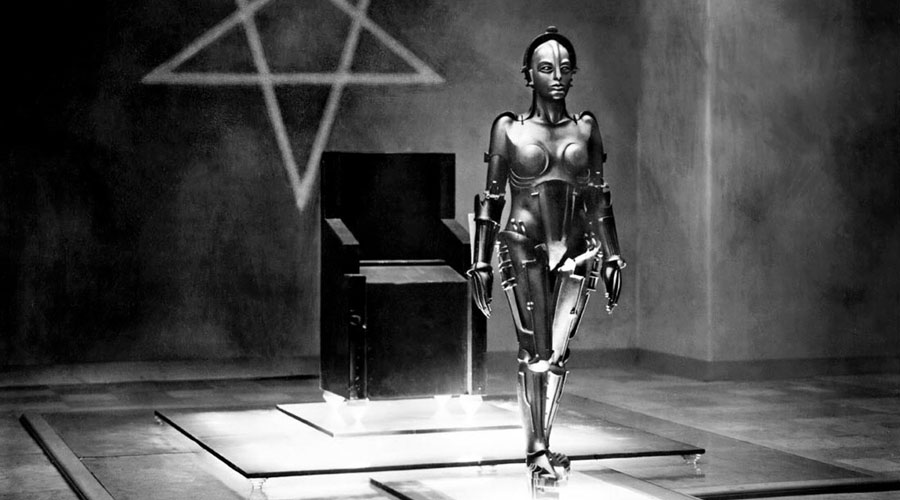Metropolis: 99 Science Fiction Films You Must See
Metropolis is the second of the silent films on this list and considered the first great science fiction film. I will go further than that – it is one of the greatest films of all time. Period. This is not hyperbole; this film is brilliant. It is beautiful and nightmarish and at times hallucinogenic. The influence on multiple films in multiple genres cannot be overstated. The images in this film have haunted the dreams of directors and writers and artists for decades. It’s a pretty amazing film.
The influence on scifi and horror is overwhelming. All depictions of the mad scientist and his electric, bubbling lab from Bride of Frankenstein to every Hammer film made is apparent and obvious. And every dystopian, crowded cityscape from Blade Runner and Dark City and Brazil and 1984 and every depiction of Gotham City on film owes a huge debt of gratitude to this movie. And that is just a small sample.
And the thing is, despite the mad scientists and shape changing robots and dystopian dark futures, this is not some popcorn fantasy adventure. It’s a scathing political statement on class and human rights and social dignity. To make these statements the film is not exactly subtle (silent films rarely are) but this does not distract from its power.
What Is It?
Released in 1927 Metropolis is one of the crowning achievements of director Fritz Lang. If you do not know the work of Fritz Lang stop right now and go watch his films, you will be better off if you do. He is a master of German Expressionism and one of the great innovators in the history of film.
Lang was seen as a perfectionist director. One that could make Kubrick look tame. It is said that extras were hurled into violent mob scenes, made to stand for hours in cold water and handled more like props than human beings. Ironically he directed much like the villains in his film.
Metropolis was meant to be anti-authoritarian metaphor. Lang stated this many times during the course of his life. Despite that the Nazis liked it enough to offer him control of their film industry; he chose to flee to America instead. But if you look at a film like Triumph of the Will released 8 years later you will see many of Lang’s visions brought to life and idealized. The exact opposite idea of what you were meant to take away from this film.
The power of the images in this film is both its benefit and its curse.

Metropolis (1927)
Fritz Lang
“Your magnificent city, Father – and you the brain of this city – and all of us in the city’s light – and where are the people, father, whose hands built your city?.”
– Freder
What’s the Story?
In a dystopian future city the super-rich idle away their days in luxurious skyscrapers far above the wretched workers who toil in the darkness.
The city is run by the ruthless Joh Fredersen, a businessman/dictator. His son Freder is in the Pleasure Gardens one day when Maria, a woman from the subterranean city, brings a group of workers’ children to the surface.
Freder is struck by Maria’s beauty and astonished to learn that there is a life led by the workers. He sets off to lean about their lives and then witnesses and accident in the factory. he sees this as a hellish vision which compels him to switch places with a worker and live the life of a worker.
Maria as it turns out is a beatific religious leader to the workers and has become a threat to Joh Fredersen and the status quo.
Joh Fredersen then enlists the help of the demented genius Rotwang who creates a robot replica of Maria, captures the real Maria, and transfers her face to the robot so that the workers will be fooled and controlled by the fake Maria.
The Fake Maria causes dissent and riot and all manner of upheaval. Fredersen orders that the workers be allowed to rampage, so that he can justifiably use force against them at a later time. And he becomes (one can assume) attracted to Fake Maria and (one can assume) gets busy with her. Then Fake Maria gets all skanky and does sexy dances. All of this cases destruction and flooding and the death so the workers decides to burn fake Maria at the stake like a witch (this has all kinds of disturbing implications that is worthy of a whole separate article).
The real Maria (chaste and awesome and not sexually damaged at all) escapes to the roof of a cathedral where she is seen not being evil and so is loved again.
Freder then unites workers and bosses because … well we need an ending.
Why See It?
It is a classic, it is beautiful and you don’t need another reason just watch it.
Now I realize that nothing in the synopsis makes sense and it is a very old movie and on the surface it just sounds ridiculous (also I did a horrible job of synopsizing). But if you understand the film as visual metaphor and a series of vignettes tied together by a singular theme it becomes something transcendent. I hate using terminology like that but it is true. There is something strangely spiritual about the film. And I’m not talking about the obvious religious (specifically Christian) imagery used. There is a very humanist sense of empowerment and possibility just bubbling under the surface. In contrast to worker’s life of mechanical drudgery there is the touch and love of another person when the day is done as they gather deep beneath the earth, in the womb, to listen to the daily speech/sermon or encouragement.
If you look at how the workers are portrayed they are seemingly straining in the act of moving the hands of a clock. On the surface this seems silly. But it works as a symbol. The workers spend the day struggling to keep the hands of time continuously moving, although in a haphazard way. They keep the gears turning while at the same time unaware that they are themselves are the gears causing the machine to turn. People as machines is constant image. And then they meet together after the shift, in the womb, and they are fluid and free. And angry. All they need is a voice, benign or otherwise, to spark the rebellion that is already there waiting. The only choice is violence or peace.
Honestly it’s a simple story. Do unto others as you would have done to you…but with robots and skyscrapers and a vague future setting. And glorious visuals that will stay with you and haunt you and perhaps inspire you.
Final Thoughts
Oddly I do not remember when I first saw this film. I can usually remember ridiculous things like this. Not things like say, my mother’s phone number or when I have a work appointment, but instead things like the first time I saw a movie or how I felt after reading the first chapter of a novel what channel my favorite TV shows were on in 1978. So it is unusual I have no memory of the first time I saw Metropolis in its entirety.
I guess it stems from the fact that this film has been bopping around in clips and stills associated for so long with the genres I like that it has become sort of a background noise. It has become something I have acquired over time in drips and drabs rather than a thing I consumed as a whole right away.
Regardless it is something I adore now and have seen in multiple ways. There are multiple versions of this film out there due to the nature of the way silent films were preserved and reconstructed over the years. There are three versions on Netflix alone for goodness sakes.
The version I own on DVD is the “New Pollutants” version. It is an extended, reconstructed and restored version using several different prints. The majority of the film is gloriously cleaned and rendered in high definition and looks just spectacular. There are spots where the print is just unrepairable and looks awful; but that is just the nature of old movies sometimes. Just be grateful we have it at all.
The real difference is the sound track. Usually you get a classical sounding score that is period appropriate and that is just fine. But the version I have has a score by the New Pollutants, a German techno band. That may sound just terrible but actually it’s pretty darned awesome. It gives a modern intensity and industrial sound to the nightmare visuals. It is how I would recommend you watch it.
But definitely watch it.
Originally published July 3, 2015












Likhon chowdhury says:
Conor says:
Andy Garcia says: